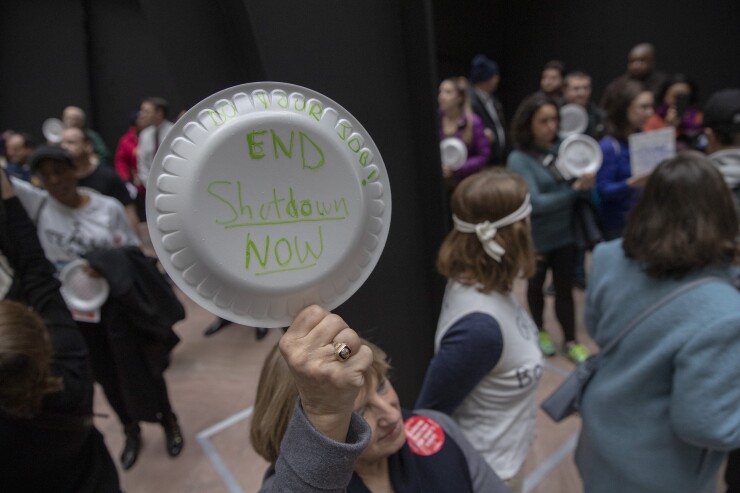WASHINGTON — When Sen. Elizabeth Warren sent a letter last week to some of the largest banks asking for details about what they were doing to aid customers affected by the government shutdown, many firms had to confront an all-too-familiar public relations dynamic: playing defense.
Before the Massachusetts Democrat sent the letter, banks had already been
But it can be hard for those stories to get traction when the banking sector at large is

“Unfortunately the way that the industry’s reputation has been neglected over the last 10 years or so, any specific examples where a bank is being unreasonable will taint the [industry] reputation as a whole,” said Rolland Johannsen, senior consulting associate with Capital Performance Group LLC. “There’s no industrywide approach to something like this — they’re dealing with it in primarily a reactive way, and you can understand why.”
Those reputational issues — deserved or not — may worsen with Democrats having gained congressional power and industry critics such as Warren eyeing 2020 presidential bids.
Observers say the effect of something like the government shutdown — in which banks' only involvement is trying to help affected customers — can pose a public relations risk that might otherwise be an opportunity for other industries.
In the case of the shutdown, many of the banks’ responses have essentially asked customers to come to them and describe what their challenges are and what relief they require, Johannsen said. That makes sense because each individual case is different, he added, and banks don’t necessarily know which of their customers are affected by the shutdown.
Warren's letter, which described steps taken by financial institutions but said their "announcements do not provide full details about the services that are actually available to affected workers and businesses." She also suggested that the largest banks were not doing enough, saying that "small banks and credit unions should not be the only financial services providers assisting federal workers during the shutdown."
Banks' reputational challenges are not surprising as the industry continues to live under a cloud more than a decade after the crisis. Annual
Art Wilmarth, a professor at George Washington University Law School, said banks face a negative confirmation bias when it comes to scandals and bad press. Bank misbehavior tends to confirm people’s disapproving opinions of the sector, while positive stories can be dismissed as outliers, he said.
“Part of the problem is, the big banks have a lot of dirt under their fingernails,” Wilmarth said. “It’s an accumulation of scandals and misconduct that weighs pretty heavily on them. So when people see one more scandal, it’s, ‘Well, that’s what we’re always hearing about them.’ ”
Marcus Stanley, policy director for Americans for Financial Reform, said the financial crisis fundamentally altered the public's view of the banking industry. Reversing those attitudes can be difficult.
“The thing about banks and the financial sector, they don’t make a tangible thing. They make money,” Stanley said. “The moral justification is [banks] understand risk really well … and that shrewd judgment benefits the economy as a whole. And the financial crisis blew that justification to smithereens.”
That attitude has also translated into a potent political weapon, with
But whatever people’s attitudes are toward the banking sector in general, most consumers are satisfied with their own banking experience. A
In addition to banks' efforts to respond to customers' concerns about the shutdown, industry groups such as the ABA have been among those urging policymakers to reopen the government. "The time to act, the time to end this shutdown is now so that we can keep the economy moving forward," a letter signed by the ABA and other trade organizations said.
But with no end to the shutdown in sight, the role of banks in mitigating the impact on government workers continues to be part of the conversation. On Thursday, Commerce Secretary Wilbur Ross
Aaron Klein, a fellow at the Brookings Institution and policy director at the Center on Regulation and Markets, said the disconnect between people’s attitudes about banking as an abstract industry and their own experiences with their bank is analogous to the
“People say they hate big banks, but there are 6,000 banks to choose from and 6,000 credit unions, and big banks keep gaining customers,” Klein said. “The value of size overcomes personal abstract preferences.”
Jason Mollica, a professional lecturer at the American University School of Communication, said the partial government shutdown presents banks with a unique challenge.
Banks are not responsible for the problem and have no way of knowing how long it will last or what kind of pain it will inflict, which he said takes something like an advertising campaign — a traditional and effective way of messaging — off the table. The key is being simple and direct in their messaging to furloughed federal worker customers, he said.
“There’s always going to be people who criticize [banks] no matter what,” Mollica said. “What helps is a simple message saying, ‘Please come to us, we’ll do what we can to help you.’ ”
Johannsen said that kind of message on an industrywide scale is what may be necessary to counteract the lingering aftertaste of the financial crisis. But banks individually should also think about how they can be proactive in differentiating themselves from the industry as a whole, he said.
“Without some sort of concerted effort by the industry … I don’t think the overall reputation is going to change,” Johannsen said. “That doesn’t mean that individual banks can’t create a very strong and powerful and positive reputation — and many do. But I don’t think you can wait for the reputational tide of the industry to lift all boats.”





